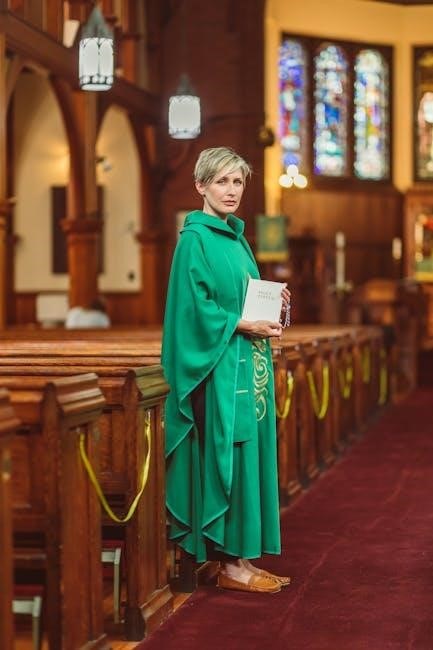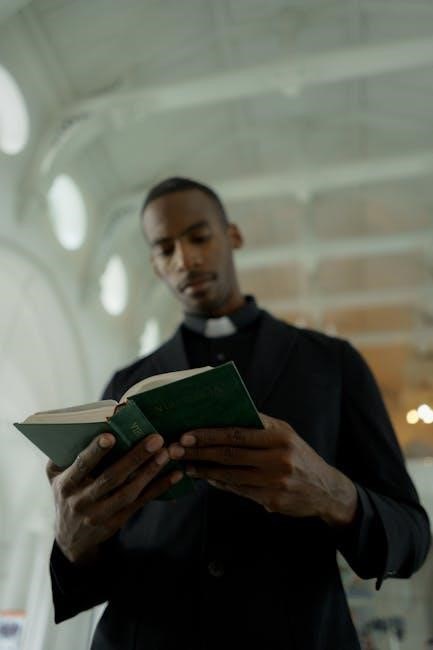The Book of Church Order (BCO) is the official governing document of the Presbyterian Church in America (PCA), outlining its structure, discipline, and worship practices. It serves as a foundational guide for unity and order within the church, reflecting Reformed theology and practices.
1.1 Overview of the Presbyterian Church in America (PCA)
The Presbyterian Church in America (PCA) is a Reformed denomination emphasizing biblical theology, church governance, and the Great Commission. Established with a commitment to faithfulness to Scripture, the PCA seeks to promote unity and accountability among its churches through structured polity and shared theological convictions, all detailed in the Book of Church Order (BCO).
1.2 Purpose and Scope of the BCO
The Book of Church Order (BCO) provides a comprehensive framework for the governance, discipline, and worship of the Presbyterian Church in America (PCA). Its purpose is to maintain unity, order, and accountability among churches and officers, ensuring fidelity to Reformed theology and practices. The BCO is accessible as a PDF on the PCA website, offering detailed guidelines for church life and mission.

Structure of the Book of Church Order
The Book of Church Order (BCO) is organized into chapters and appendices, covering government, discipline, and worship. It is available as a PDF for easy access.
2.1 Chapters and Appendices
The Book of Church Order (BCO) is divided into three main chapters, each addressing key aspects of church governance. Chapter 1 focuses on government, while Chapter 2 covers disciplinary procedures. Chapter 3 delves into worship practices, ensuring a comprehensive guide for church operations. Appendices provide additional resources, making the BCO a detailed and accessible document for church leaders and members alike.
2.2 Key Sections: Government, Discipline, and Worship
The Book of Church Order (BCO) is organized into three primary sections: Government, Discipline, and Worship. These sections provide a comprehensive framework for church operations, ensuring unity and order. The Government section outlines church structure and leadership roles. Discipline focuses on maintaining biblical standards and resolving disputes. Worship guides congregational practices, sacraments, and ordinances, reflecting Reformed theology and traditions.
The Form of Government
The Form of Government establishes the structure and leadership roles within the PCA, guiding decision-making processes and ensuring accountability according to Reformed principles and biblical standards.
3.1 Church Officers and Their Roles
Church officers in the PCA include Ministers, Elders, and Deacons, each with distinct roles. Ministers preach and teach, Elders govern and care for members, while Deacons manage benevolence and practical needs. Officers must adhere to biblical standards, upholding Reformed theology and ensuring the church operates according to the BCO’s guidelines, fostering unity and accountability in church life and mission.
3.2 Congregational Meetings and Decision-Making
Congregational meetings in the PCA are governed by the BCO, ensuring orderly decision-making. These meetings address church matters, with procedures outlined for voting, quorums, and officer elections. The BCO emphasizes unity and adherence to Reformed principles, guiding congregations to make decisions that align with Scripture and maintain church order, fostering a structured and faithful approach to church governance.
The Rules of Discipline
The Rules of Discipline in the BCO provide a biblical framework for addressing sin and maintaining holiness within the church, ensuring accountability and restoration among members and officers.
4.1 Judicial Process in the PCA
The judicial process in the PCA is structured to maintain accountability and fairness, with processes outlined in the BCO for addressing disputes and disciplinary matters. It ensures that all actions are conducted in accordance with Scripture and the church’s governing principles, providing a clear framework for resolving conflicts and upholding church order.
4.2 Disciplinary Procedures for Members and Officers
The BCO outlines detailed disciplinary procedures for both members and officers, ensuring accountability and adherence to biblical standards. These procedures, rooted in Scripture, provide a structured approach to addressing sin and misconduct. The process emphasizes restoration and reconciliation while maintaining church order, with clear guidelines for corrective measures and the involvement of church courts when necessary.

The Directory for Worship
The Directory for Worship provides guidelines for Reformed worship practices, ensuring consistency with biblical and theological standards. It covers sacraments, ordinances, and liturgical elements, promoting unity and reverence in worship.
5.1 Worship Practices and Guidelines
The Directory for Worship outlines Reformed worship practices, emphasizing the centrality of Scripture and sacraments. It provides guidelines for the organization of worship, including prayer, preaching, baptism, and communion. The directory ensures consistency with biblical standards, promoting reverence and unity in corporate worship, while allowing for appropriate cultural expressions within theological boundaries.
5.2 Sacraments and Ordinances
The BCO recognizes two sacraments: baptism and the Lord’s Supper, as instituted by Christ. It provides detailed guidelines for their administration, emphasizing their role in the church’s life. Baptism is administered to believers and their children, while communion is for the spiritually prepared. These ordinances are seen as means of grace and are to be conducted with reverence, reflecting their theological significance in Reformed worship.

Resources for Studying the BCO
The PCA offers a downloadable PDF version of the BCO on its official website, along with study guides and commentaries to aid in understanding its principles and applications.
6.1 PDF Copies and Online Availability
The Presbyterian Church in America (PCA) provides a downloadable PDF version of the Book of Church Order on its official website. This resource includes the complete text, covering government, discipline, and worship practices. The 6th edition is available, featuring 402 pages and all amendments up to the 48th and 49th General Assemblies. This format ensures easy access and portability for study and reference.
6.2 Study Guides and Commentary
Supplemental study guides and commentaries are available to aid in understanding the BCO. The PCA website offers detailed resources, including digital formats, to assist officers and members. These tools provide theological insights, practical applications, and historical context, enhancing comprehension of the BCO’s teachings and relevance in church governance and life. They are accessible online and through various Reformed theological platforms and publishers, such as Amazon and denominational outlets.
Amendments and Revisions
The BCO undergoes periodic revisions to reflect the evolving needs of the church. Amendments are indicated by marginal bullets and updated annually to ensure relevance and clarity.
7.1 Historical Amendments to the BCO
Historical amendments to the BCO reflect the PCA’s commitment to maintaining biblical integrity while addressing contemporary issues. Earlier editions established foundational principles, while recent updates ensure alignment with modern church dynamics and Reformed theology. These revisions demonstrate the balance between preserving tradition and adapting to the needs of a changing world.
7.2 Recent Updates and Their Implications
Recent updates to the BCO reflect the PCA’s commitment to maintaining relevance while upholding Reformed theology. Amendments from the 48th and 49th General Assemblies address contemporary issues, ensuring clarity in church governance and disciplinary procedures. These changes enhance accountability, streamline decision-making, and align practices with the church’s mission. They underscore the importance of adapting to modern challenges while preserving foundational principles.

The Significance of the BCO in Reformed Churches
The BCO is a cornerstone for Reformed churches, providing a unified framework for governance, discipline, and worship. It ensures doctrinal integrity and promotes unity across congregations.
8.1 Theological Foundations
The BCO is rooted in Reformed theology, emphasizing the authority of Scripture and the sovereignty of God. It reflects the Westminster Standards, ensuring consistency with historic Reformed beliefs. The document provides a biblical framework for church governance, discipline, and worship, maintaining fidelity to the teachings of the Presbyterian Church in America and upholding Christ-centered leadership and obedience to His laws. This theological grounding ensures unity and doctrinal integrity across PCA congregations, fostering a cohesive understanding of church life and mission, while also addressing practical aspects of church operations and member conduct, all within a biblically informed structure.
8.2 Practical Applications in Church Life
The BCO provides clear guidelines for church operations, ensuring order and unity in practices. It outlines roles of officers, congregational meetings, and decision-making processes, offering a structured approach to church governance and discipline. These practical applications help maintain accountability and consistency across PCA churches.
The document also includes detailed procedures for addressing sins, resolving disputes, and conducting worship services, ensuring that church life aligns with Reformed principles and fosters a disciplined, Christ-centered community. This practical framework supports the mission and daily functioning of PCA congregations effectively.

The Mission of the PCA
The PCA’s mission focuses on planting Reformed churches and spreading the gospel. The BCO supports this mission by providing a structured framework for church governance and practices, ensuring unity in fulfilling its evangelistic and disciplinary goals effectively.
9.1 Evangelism and Church Planting
The PCA emphasizes evangelism and church planting as core missions, guided by the BCO. It provides frameworks for establishing new churches, ensuring they adhere to Reformed theology and governance. The BCO’s structured approach helps maintain doctrinal integrity while fostering growth and outreach, enabling churches to effectively spread the gospel and plant new congregations with unified purpose and clarity.
9.2 The Role of the BCO in Missional Work
The BCO plays a crucial role in missional work by providing a theological and structural framework for the PCA’s evangelistic efforts. It ensures that church planting and outreach activities align with Reformed principles, maintaining consistency in doctrine and practice. By governing church operations, the BCO enables missionaries and church planters to focus on spreading the gospel while adhering to established standards and accountability. This unity in mission and governance strengthens the church’s witness and effectiveness in fulfilling the Great Commission.

The BCO and Church Leadership
The BCO establishes standards for church leaders, ensuring accountability and obedience to Christ’s laws, providing a comprehensive guide for governance and discipleship within the PCA.
10.1 Standards for Officers
The BCO outlines specific standards for church officers, ensuring they are faithful in doctrine and life. Officers must meet biblical qualifications and undergo rigorous ordination processes. They are examined by higher assemblies to maintain unity and accountability, reflecting the Reformed emphasis on disciplined leadership. These standards aim to uphold the integrity of church governance and ensure officers lead with integrity and humility, fostering a healthy church environment.
10.2 Accountability and Obedience to Christ’s Laws
The BCO emphasizes accountability among officers, requiring them to uphold Christ’s laws and lead with integrity. Officers are expected to model biblical standards, submit to church authority, and remain faithful to Reformed theology. This accountability ensures that leadership reflects Christ’s teachings, fostering a culture of obedience and humility within the church, aligning with the PCA’s commitment to disciplined and faithful service.

Historical Context of the BCO
The Book of Church Order has evolved through various editions, reflecting the PCA’s governance, discipline, and worship practices, rooted in Reformed theology and Presbyterian polity since its inception.
11.1 Development of the BCO
The Book of Church Order was developed to establish a unified system of governance for the PCA, ensuring consistency in church operations and adherence to Reformed principles. It underwent several revisions, incorporating feedback from church leaders and members to address emerging challenges and maintain theological integrity. The BCO’s development reflects the PCA’s commitment to orderly church life and biblical governance.
11.2 Its Role in Presbyterian Polity
The Book of Church Order is central to Presbyterian polity, providing a structured framework for church governance. It outlines the roles of church officers, congregational meetings, and disciplinary procedures, ensuring accountability and unity across the denomination. The BCO’s principles guide decision-making processes, fostering a balanced approach to leadership and maintaining the integrity of Reformed theology within the PCA’s ecclesiastical system.
The BCO and Church Discipline
The Book of Church Order provides guidelines for maintaining accountability and order within the church, addressing sins and disputes through structured disciplinary procedures to uphold unity and integrity.
12.1 The Importance of Discipline in Church Life
Discipline within the church ensures accountability, maintaining holiness and order among members and officers. It promotes unity, addresses sin, and upholds the church’s integrity, reflecting Reformed theological principles as outlined in the BCO.
12.2 Procedures for Addressing Sins and Disputes
The BCO provides a structured approach to addressing sins and disputes, emphasizing restoration and maintaining church order. Procedures include private confrontation, mediation, and, if unresolved, escalation to church courts for judicial review, ensuring biblical principles guide the process.

The BCO and Worship
The BCO provides a theological foundation for worship, emphasizing Reformed practices. It includes guidelines for sacraments and ordinances, ensuring consistency with Presbyterian traditions and biblical principles.
13.1 Reformed Worship Practices
The BCO outlines Reformed worship practices centered on the Word of God, emphasizing preaching, prayer, and sacraments. It provides guidelines for baptism, the Lord’s Supper, and other ordinances, ensuring consistency with Presbyterian traditions and biblical principles while fostering a reverent and orderly worship environment that reflects Reformed theology and enriches the spiritual life of the congregation.
13.2 The Role of the Directory for Worship
The Directory for Worship serves as a comprehensive guide for worship practices in the PCA, providing detailed regulations for sacraments, ordinances, and other liturgical elements. It ensures consistency with Reformed theology and PCA standards, offering pastors and congregations a structured framework to conduct worship services in a manner that honors God and promotes spiritual growth and unity within the church.

The BCO and Church Governance
The BCO provides a structured framework for church governance, outlining principles and practices that ensure order and unity within the Presbyterian Church in America.
14.1 Presbyterian Polity
The Presbyterian Church in America (PCA) operates under a Presbyterian polity, characterized by a representative form of government. This system emphasizes the authority of Scripture, the role of elected elders, and a hierarchical structure comprising sessions, presbyteries, and the General Assembly. The Book of Church Order (BCO) outlines this governance, ensuring accountability, unity, and adherence to Reformed principles across the denomination.
14.2 The Role of Sessions and Presbyteries
In the PCA, sessions are local church councils of elected elders overseeing spiritual life, while presbyteries are regional bodies governing multiple churches. Sessions manage local decisions, discipline, and order, adhering to the BCO. Presbyteries provide broader oversight, resolving disputes, and ensuring fidelity to Reformed principles. Together, they maintain unity, accountability, and proper governance within the denomination’s hierarchical structure.
The Book of Church Order (BCO) is an essential guide for the Presbyterian Church in America, ensuring unity, order, and fidelity to Reformed theology. It provides clarity on government, discipline, and worship, serving as a timeless resource for church life and mission;
15.1 The BCO as a Guide for Church Life
The Book of Church Order (BCO) serves as a comprehensive guide for the Presbyterian Church in America, providing clear directives on governance, discipline, and worship. It ensures unity and order, enabling church officers and members to align their practices with Reformed theology. The BCO’s availability as a PDF resource from the PCA website facilitates accessibility for study and reference, making it an indispensable tool for church planting, mission, and daily church life.
15.2 Its Enduring Relevance in Modern Church Contexts
The Book of Church Order (BCO) remains a vital resource in modern church contexts, offering timeless principles for governance, discipline, and worship. Its relevance is evident in its consistent updates, incorporating contemporary challenges while maintaining Reformed integrity. As a PDF, it’s easily accessible, ensuring its teachings reach new generations and guide evolving church needs, fostering unity and adherence to biblical standards in a dynamic world.
